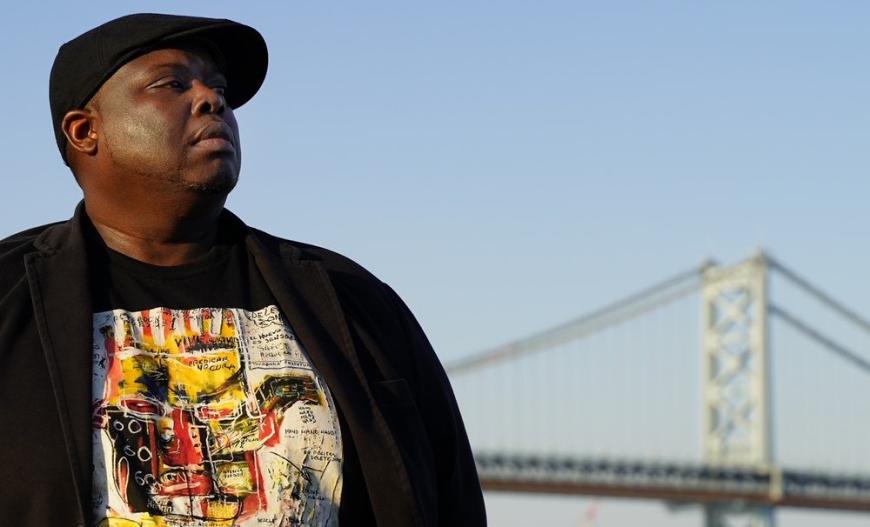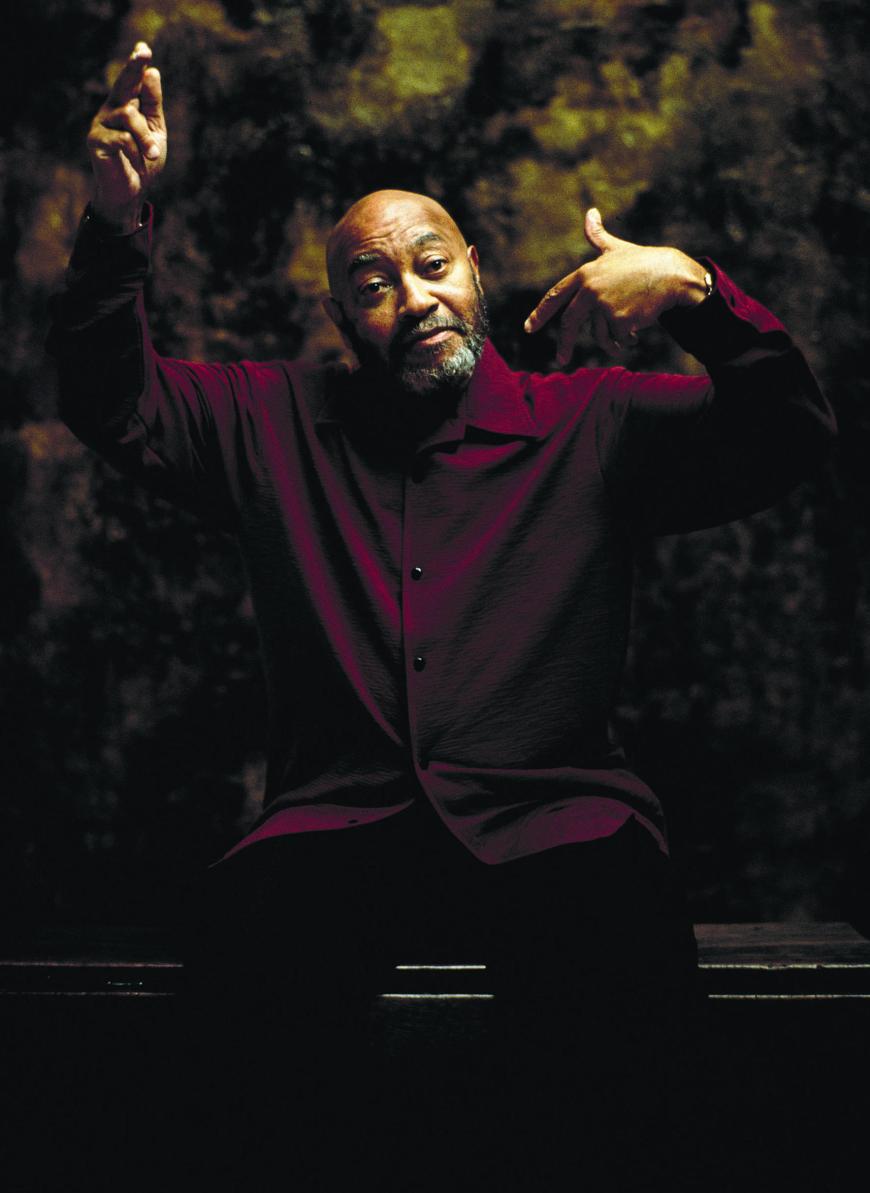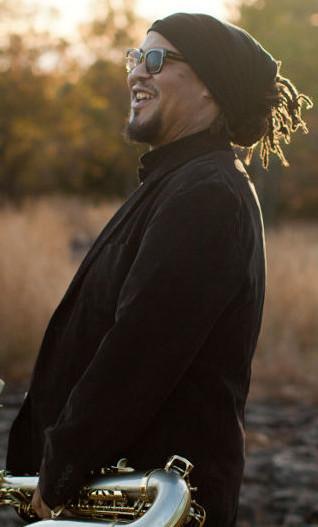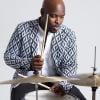
There’s something wonderfully apt about Johnathan Blake’s SFJAZZ residency this week, which marks his Bay Area debut as a bandleader.
It’s not so much that the 47-year-old drummer is stepping forward at a ripe moment in his career. A sought-after sideman with about 100 albums to his credit, Blake is one of jazz’s elite accompanists, and his recent projects have established him as a resourceful composer willing to tackle big ideas.
What makes the timing of his four-night, eight-show run Feb. 8–11 in the Joe Henderson Lab so propitious is that it follows on the heels of his Miner Auditorium performances last week with SFJAZZ Resident Artistic Director Kenny Barron, Blake playing in the piano maestro’s trio on Thursday and his quintet on Friday.

These sorts of relationships speak to the way that the jazz scene can feel like an extended family, as Barron was close with Blake’s father, the late great Philadelphia violinist John Blake Jr. Barron first hired the drummer about two decades ago, and the pianist has exerted a profound influence on Blake.
“With every band, I’m always feeling I take away something compositionally or attitude-wise or how to read the room,” Blake said. “With Kenny, I’ve always been a fan of his sound. That’s part of his personality, and I’m always amazed and inspired that he gets to his sound right away. It doesn’t matter what piano he’s playing.”
As a composer, Blake has absorbed fundamental lessons from Barron, as well as trumpet great Tom Harrell, another jazz legend with whom the drummer spent years touring and recording. “Kenny’s use of space and these very slick, memorable melodies that stay in your head have really influenced me,” Blake said. “The harmonic structure could be advanced, but the melody is more simple. I love that. I try to write simpler melodies, while the harmonies move in different ways, and [Barron] and Tom Harrell are responsible for that.”
Since releasing his debut album on Sunnyside Records, 2012’s The Eleventh Hour with saxophonists Mark Turner and Jaleel Shaw, Blake has grown increasingly confident as a composer. On his 2019 double album Trion with saxophonist Chris Potter and bassist Linda May Han Oh and his recent releases for Blue Note — 2021’s Homeward Bound and 2023’s Passage — he’s crafted albums contoured to his bandmates’ rhythmic and melodic resources.
Both Blue Note albums feature Blake’s quintet Pentad, which is built on a rhythm section with Cuban pianist David Virelles and veteran bassist Dezron Douglas, who are also in their 40s. The front line features alto saxophonist Immanuel Wilkins and vibraphonist Joel Ross, rising stars in their 20s.
The band Blake brings to the Joe Henderson Lab this week is quite different, though Douglas still anchors the rhythm section and another spectacular Cuban musician holds down the piano chair, Fabian Almazan (heard widely around California last month in the band of his wife, Linda May Han Oh).
Though this is one of Almazan’s first tours with Blake, “we’ve played and recorded together as sidemen, and I’ve always been a fan,” the drummer said. “Fabian brings this rhythmic aspect to the music from Cuba. He does some things where I’m like, ‘I didn’t know it could sound like that.’ And I’ve known Dezron since my first gig with Kenny Garrett about 20 years ago. We also play in Ravi Coltrane’s group. We know each other so well. He’s got this thing I love about bass players, this elasticity, this push-and-pull thing where we can stretch the bar line as one unit.”
In the same way that Pentad showcases two of the most acclaimed young players on the scene, this quintet at SFJAZZ introduces Houston vibraphonist Jalen Baker. With Ross’s career taking off — he just came through the Bay Area on tour with the Blue Note Records 85th-anniversary band led by pianist Gerald Clayton — it’s been getting increasingly difficult to pin him down for Pentad gigs.
Looking for a vibraphonist to cover the chair, “Jalen was put in my ear by his uncle, Jason Hainsworth,” Blake said, referring to the tenor saxophonist and executive director of the San Francisco Conservatory of Music’s Roots, Jazz, and American Music program. “Jason and I were roommates at William Paterson University, and he’d say, ‘You’ve got to hear my nephew!’ ‘OK, send me some stuff.’ I thought he sounded great, so this past October, when I had a week at the Village Vanguard, I hired him, and he came in like a pro. He learned all my music and was ready.”

Rounding out the band is veteran tenor saxophonist Dayna Stephens, who grew up in the East Bay and graduated from Berkeley High in 1997. He and Blake live in the same Paterson, New Jersey, apartment building and play together in the Kenny Barron Quintet. Their connection is exemplified by Stephens’s tune “Blakonian Groove,” a piece he recorded on his 2020 album Right Now! Live at the Village Vanguard.
“Johnathan is well versed in writing serious songs, but he can also write joyous songs,” Stephens said. “When I wrote what was initially a bass line, it struck me as a happy, bouncy groove, and that defines Blake in a few ways.”
It’s interesting that Stephens started the tune with a bass line, as that was the instrument he was playing when Blake first met him at the Umbria Jazz Festival in the early aughts. The drummer was in Italy to perform with the Mingus Big Band, and Stephens was part of an ensemble with the prestigious Thelonious Monk Institute of Jazz.
“I didn’t even know he was a saxophonist for years,” Blake said. “I thought he was a bassist! Fast forward to now, we live four doors down from each other.”
While Blake will be playing some material from his recent album Passage, he’s focusing on the West Coast premiere of his suite My Life Matters, which was commissioned by the Jazz Gallery in Manhattan in 2017. It’s a work of protest against police brutality and a soulful supplication for unity, with instrumental themes encouraging “us to see each other as one race, the human race,” he said. “When one is down, we’re all down. It’s easy to see the differences, and we need more work to see how we’re the same.”
After not playing the suite for several years after the advent of the pandemic, Blake brought it back into his repertoire last fall for that week at the Village Vanguard. For Stephens, who was on the gig, it was an opportunity to see how his friend’s writing had evolved.
“This particular suite is a real benchmark in terms of writing a collection of music around one idea,” he said. “Playing it at the Vanguard last October, every night the music went new places, circling around what’s written, getting deeper and more loose. You can tell that Johnathan has played with a thousand amazing bandleaders and was really smart in setting up the songs so there was a lot of freedom and room for us to create a slightly different take on the same message.”



